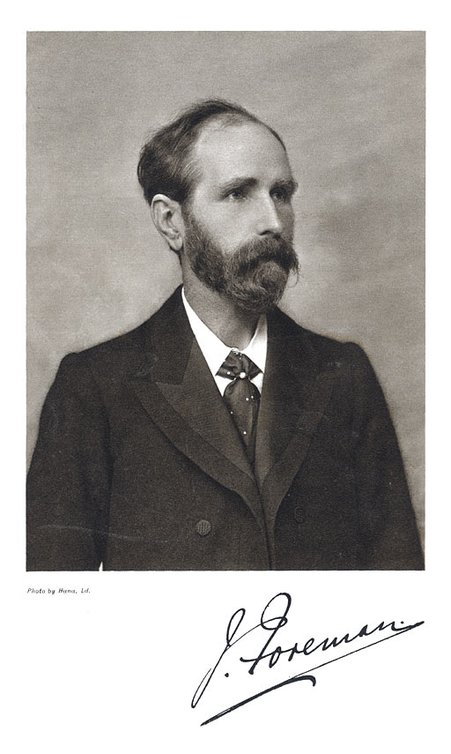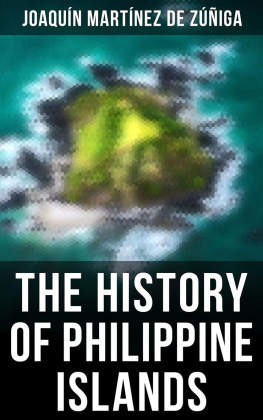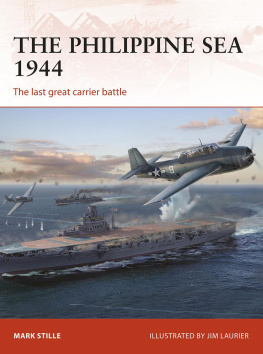John Foreman - The Philippine Islands
Here you can read online John Foreman - The Philippine Islands full text of the book (entire story) in english for free. Download pdf and epub, get meaning, cover and reviews about this ebook. year: 2010, publisher: General Books LLC, genre: Science. Description of the work, (preface) as well as reviews are available. Best literature library LitArk.com created for fans of good reading and offers a wide selection of genres:
Romance novel
Science fiction
Adventure
Detective
Science
History
Home and family
Prose
Art
Politics
Computer
Non-fiction
Religion
Business
Children
Humor
Choose a favorite category and find really read worthwhile books. Enjoy immersion in the world of imagination, feel the emotions of the characters or learn something new for yourself, make an fascinating discovery.
- Book:The Philippine Islands
- Author:
- Publisher:General Books LLC
- Genre:
- Year:2010
- Rating:5 / 5
- Favourites:Add to favourites
- Your mark:
- 100
- 1
- 2
- 3
- 4
- 5
The Philippine Islands: summary, description and annotation
We offer to read an annotation, description, summary or preface (depends on what the author of the book "The Philippine Islands" wrote himself). If you haven't found the necessary information about the book — write in the comments, we will try to find it.
The Philippine Islands — read online for free the complete book (whole text) full work
Below is the text of the book, divided by pages. System saving the place of the last page read, allows you to conveniently read the book "The Philippine Islands" online for free, without having to search again every time where you left off. Put a bookmark, and you can go to the page where you finished reading at any time.
Font size:
Interval:
Bookmark:
The Project Gutenberg EBook of The Philippine Islands, by John Foreman
This eBook is for the use of anyone anywhere at no cost and with
almost no restrictions whatsoever. You may copy it, give it away or
re-use it under the terms of the Project Gutenberg License included
with this eBook or online at www.gutenberg.org
Title: The Philippine Islands
Author: John Foreman
Release Date: September 30, 2007 [EBook #22815]
Language: English
*** START OF THIS PROJECT GUTENBERG EBOOK THE PHILIPPINE ISLANDS ***
Produced by Jeroen Hellingman and the Online Distributed
Proofreading Team at http://www.pgdp.net/

The Author.
London: T. Fisher Unwin
1, Adelphi Terrace.
MCMVI
- Preface to the First Edition
- Preface to the Third Edition
- Table of Contents
- List of Illustrations
- Introduction
- General Description of the Archipelago
- Discovery of the Archipelago
- Philippine Dependencies, Up To 1898: The Ladrones, Carolines and Pelew Islands
- Attempted Conquest by Chinese
- Early Relations With Japan
- Conflicts with the Dutch
- British Occupation of Manila
- The Chinese
- Wild Tribes and Pagans
- Mahometans and Southern Tribes
- Domesticated NativesOriginCharacter
- The Religious Orders
- Spanish Insular Government
- Spanish-Philippine Finances
- Trade of the Islands: Its Early History
- Agriculture
- Manila HempCoffeeTobacco
- Sundry Forest and Farm Produce: MaizeCacaoCoprah, Etc.
- Mineral Products: CoalGoldIronCopperSulphur, Etc.
- Domestic Live-stockPonies, Buffaloes, Etc.
- Manila Under Spanish Rule
- The Taglog Rebellion of 189698: First Period
- The Taglog Rebellion of 189698: Second Period: American Intervention
- An Outline of the War of Independence, Period 18991901
- The Philippine Republic in the Central and Southern Islands
- The Spanish Prisoners
- End of the War of Independence and After
- Modern Manila
- The Land of the Moros: Allah Akbar!
- The Spanish Friars, After 1898
- Trade and Agriculture Since the American Advent
- Trade Statistics
- Chronological Table of Leading Events
- Index
Printed and bound by Hazell, Watson and Viney, LD., London and Aylesbury.
It would be surprising if the concerns of an interesting Colony like the Philippine Islands had not commanded the attention of literary genius.
I do not pretend, therefore, to improve upon the able productions of such eminent writers as Juan de le Concepcion, Martinez Ziga, Toms de Comyn and others, nor do I aspire, through this brief composition, to detract from the merit of Jagors work, which, in its day, commended itself as a valuable book of reference. But since then, and within the last twenty years, this Colony has made great strides on the path of social and material progress; its political and commercial importance is rapidly increasing, and many who know the Philippines have persuaded me to believe that my notes would be an appreciated addition to what was published years ago on this subject.
The critical opinions herein expressed are based upon personal observations made during the several years I have travelled in and about all the principal islands of the Archipelago, and are upheld by reference to the most reliable historical records.
An author should be benevolent in his judgement of men and manners and guarded against mistaking isolated cases for rules. In matters of history he should neither hide the truth nor twist it to support a private view, remembering how easy it is to criticize an act when its sequel is developed: such will be my aim in the fullest measure consistent.
By certain classes I may be thought to have taken a hypercritical view of things; I may even offend their susceptibilitiesif I adulated them I should fail to chronicle the truth, and my work would be a deliberate imposture.
I would desire it to be understood, with regard to the classes and races in their collectedness, that my remarks apply only to the large majority; exceptions undoubtedly there arethese form the small minority. Moreover, I need hardly point out that the native population of the capital of the Philippines by no means represents the true native character, to comprehend which, so far as its complicacy can be fathomed, one must penetrate into and reside for years in the interior of the Colony, as I have done, in places where extraneous influences have, as yet, produced no effect.
There may appear to be some incongruity in the plan of a work which combines objects so dissimilar as those enumerated in the Contents pages, but this is not exclusively a History, or a Geography, or an Account of Travelsit is a concise review of all that may interest the reader who seeks for a general idea of the condition of affairs in this Colony in the past and in the present.
J. F.
The success which has attended the publication of the Second Edition of this work has induced me to revise it carefully throughout, adding the latest facts of public interest up to the present period.
Long years of personal acquaintance with many of the prime movers in the Revolutionary Party enabled me to estimate their aspirations. My associations with Spain and Spaniards since my boyhood helped me, as an eye-witness of the outbreak of the Rebellion, to judge of the opponents of that movement. My connection with the American Peace Commission in Paris afforded me an opportunity of appreciating the noble desire of a free people to aid the lawful aspirations of millions of their fellow-creatures.
My criticism of the regular clergy applies only to the four religious confraternities in their lay capacity of government agents in these Islands and not to the Jesuit or the Paul fathers, who have justly gained the respect of both Europeans and natives: neither is it intended, in any degree, as a reflection on the sacred institution of the Church.
I take this opportunity of acknowledging, with gratitude, my indebtedness to Governor-General Luke E. Wright, Major-General Leonard Wood, Colonel Philip Reade, Major Hugh L. Scott, Captain E. N. Jones, Captain C. H. Martin, Captain Henry C. Cabell, Captain George Bennett, Captain John P. Finley, Dr. David P. Barrows, Mr. Tobias Eppstein, and many others too numerous to mention, who gave me such valuable and cordial assistance in my recent investigations throughout the Archipelago.
This book is not written to promote the interests of any person or party, and so far as is consistent with guiding the reader to a fair appreciation of the facts recorded, controversial comment has been avoided, for to pronounce a just dictum on the multifarious questions involved would demand a catholicity of judgement never concentrated in the brain of a single human being.
I am persuaded to believe that the bare truth, unvarnished by flattery, will be acceptable to the majority, amongst whom may be counted all those educated Americans whose impartiality is superior to their personal interest in the subject at issue.
Font size:
Interval:
Bookmark:
Similar books «The Philippine Islands»
Look at similar books to The Philippine Islands. We have selected literature similar in name and meaning in the hope of providing readers with more options to find new, interesting, not yet read works.
Discussion, reviews of the book The Philippine Islands and just readers' own opinions. Leave your comments, write what you think about the work, its meaning or the main characters. Specify what exactly you liked and what you didn't like, and why you think so.






